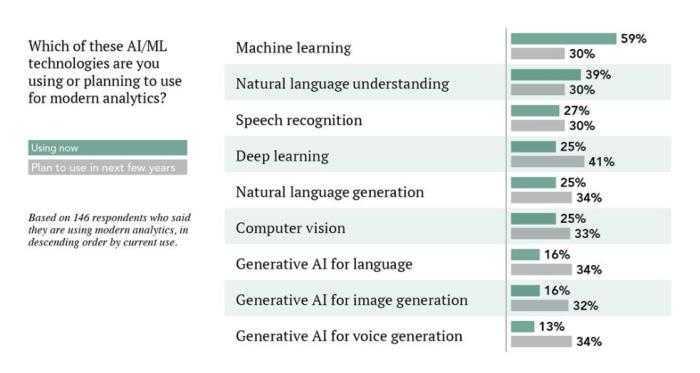
The Top-Down Approach to AI: A Mandate for Today’s CEOs
Artificial intelligence is a fast-changing technology, and CEOs must do more than just be aware of it. As a CEO, it’s up to you to lead the charge into the AI-enabled future for your enterprise.
- By Rajeev Kapur
- September 1, 2023
Artificial intelligence (AI) has been an integral part of our daily lives, from Netflix recommendations to interactive tools such as Siri, for some time. AI can enhance decision-making by sifting through mountains of data, automating processes, personalizing experiences, and helping tackle a host of problems around the world, from healthcare to sustainability. However, until now it has never had the transformational potential of today’s generative AI tools, such as ChatGPT.
This AI-led transformation is not just a technological journey; it’s a strategic shift that demands a top-down approach from your organization’s leaders. In fact, either you (the CEO) embrace this, or you and your enterprise will be left behind. A recent TDWI survey showed wide adoption rates for a variety of machine learning (ML) and AI technologies (see Figure 1).
|

Figure 1: AI/ML technologies in use. Source: 2023 TDWI Best Practices Report: Achieving Success
with Modern Analytics, available at tdwi.org/bpreports. (Click to enlarge)
|
You Can’t Afford to Fall BehindYou Can’t Afford to Fall Behind
Failure to embrace AI comes with risks, most obviously the risk of losing your competitive edge. That’s not all you can lose -- in our tech-savvy era, being perceived as a tech laggard can harm your company’s image or even cause your company to fail (think smartphone maker BlackBerry).
Failure to take advantage of the operational efficiencies AI offers can result in higher costs and slower processes. You may need those efficiencies as the future demands of doing business necessitate the data management and processing power that AI provides.
You might also lose your job; although no one knows with absolute certainly what the future holds, CEOs (and their teams) who refuse to implement AI will likely be replaced by those who support it.
Dr. Andrew Ng, a leading AI expert, once said, "Just as electricity transformed almost everything 100 years ago, today I actually have a hard time thinking of an industry that I don’t think AI will transform in the next several years." The top-down approach is not just a strategy; it's a survival imperative. CEOs must foster a culture that embraces AI, augments human intelligence, and leverages technology. The future is here; it begins with enlightened leadership.
AI Implementation as a Top-Down Initiative
Integrating AI within your organization successfully requires more than technological know-how; it requires strategic actions that must be directed from the top:
- Aligning AI with your business strategy. Google's success with AI in its search engine demonstrates the importance of aligning AI with a company’s long-term goals.
- Developing an enterprise data strategy. An upcoming TDWI Best Practices Report notes that “analytics models built and tested with poor and incomplete data can lead to bad business decisions and unsatisfactory customer interactions.” The same goes for AI: if you feed it poor-quality data, you’ll receive not-so-intelligent results.
- Defining the role AI will play. A recent Upside article showed how taking a business-first approach to data and analytics produces more applicable results, so CEOs should be ready to take a leading role in defining the questions AI initiatives will be expected to answer, especially as this will be key to guiding data quality efforts.
- Allocating resources. As Microsoft's CEO Satya Nadella has demonstrated, making your AI initiatives a priority for resources can lead to success.
- Managing change. CEO-led initiatives provide leadership to drive cultural acceptance.
Building a Culture That Embraces AI
In the same way CEOs face challenges in creating data-driven organizations, they also face challenges in creating a culture that embraces and supports AI. Some of the same steps you take to create a data-driven culture can also be employed to take your enterprise closer to its AI future.
As a CEO, building your culture involves:
- Explaining your vision. Explain the basics of the AI initiative you’re introducing. What is it and why is it important? How will you leverage its benefits?
- Educating and inspiring. Seminars and open discussions foster understanding and address the key issues employees will likely have as they push back against change. Do not shy away from employee fears (one of the biggest being that AI will replace current and future employees -- as exemplified by IBM’s employment news earlier this year). Explain the benefits your employees will enjoy. If your business goal is to adopt generative AI to help automate routine tasks and free individuals to spend more time performing creative work requiring human thought, say so.
- Investing in talent. Initially you may need to look outside your enterprise for the talent you need, but continual in-house training can also help you develop the talent in employees who already have the corporate knowledge that makes them valuable. Continual learning, as seen at Tesla, sets the example.
- Encouraging experimentation. CEOs must foster an environment where failure is part of learning. If there was ever a time in business to encourage this concept, this is it. The “fail fast” principle of the agile methodology will serve you well.
- Understanding the dimensions of AI ethics and pledging to follow international guidelines. Adhering to global standards (both existing and emerging) is paramount. Transparency in your use of AI builds trust from employees, customers, and partners alike.
Getting Started: What You Can -- And Must -- Do Today
How do you put these ideas to work? Besides building an AI culture, you can take these steps to ensure AI success.
1. Assess your current AI maturity. A clear assessment charts the course. Determine where you’re going by first understanding where you are now.
2. Ensure clean, managed, high-quality data. Poor data quality leads to poor decisions.
3. Be sure your teams have the AI tools they need. For example, reimburse key employees for subscriptions to ChatGPT 4.
4. Leverage your data science/analytics team(s). Collaboration ensures the results of your AI projects are tailored to your environment and your business strategy and goals.
5. Invest in quick wins. As we’ve learned from the agile development methodology, small initial project “wins” can generate enthusiasm and help others see the benefits (current and potential) of the project. Strive for that immediate value. Applying AI to current processes in small but visible ways can generate momentum to drive greater acceptance and enthusiasm.
6. Invest in initiatives that support AI. Elevate the importance of data-quality initiatives. Undertake data cleansing projects to ensure the data you feed your model is complete, accurate, and free of bias.
7. Keep up to date on developments. Continual training isn’t just for your staff. AI is a fast-changing technology. You need to stay on top of new use cases, new applications and add-ons, the growing limitations and problems (such as increasingly sophisticated deepfakes), and the legal and ethical issues of AI (especially generative AI). [Editor’s note: Besides TDWI’s coverage of AI issues, check out our sister site, Pure AI, for the latest AI news and analysis.]
8. Don’t be afraid. Embrace the tools yourself and lead by example.
The Bottom Line
The time to act is now. Assess your AI readiness, prioritize AI in your corporate strategy, communicate your vision, and foster an environment that encourages learning and innovation. The path towards AI success is complex but achievable, but only if you lead with vision, courage, and wisdom.